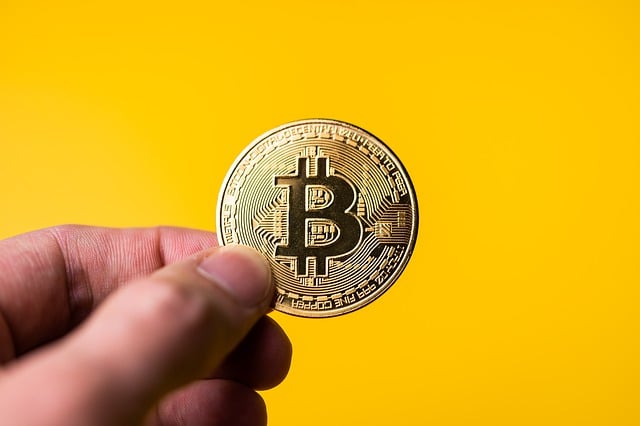This article is designed to answer the question – is Bitcoin a good investment? We’ll begin with an overview of the technology, then weigh up the advantages and disadvantages of owning cryptocurrency.
What is Bitcoin and how does it work?
A digital currency which runs on a technology called blockchain. Its symbol is BTC. Bitcoin is actually one of many ‘cryptocurrencies’, named after the cryptography (i.e. code and passwords) that secure them.
What cryptocurrencies have in common is that they are underpinned by a system of trust utlising crytopgraphy, and an emerging technology known as blockchain.

How can you invest in bitcoin?
Direct holdings of bitcoin
You can invest in real bitcoin using a broker such as eToro or an exchange such as Bitcoin.com.au.
Please note that since 14 January in the UK, financial brokers cannot provide CFDs (contracts for difference) and leveraged positions in cryptocurrencies.
However, you can still invest in the underlying asset, by buying bitcoin with brokers such as eToro. More detail below.
Remember, Cryptoassets are a highly volatile unregulated investment product. No EU investor protection. Your capital is at risk. You can compare the best crypto exchanges in the UK at Coin Companion.
Bitcoin funds to invest in
An emerging method of investing in Bitcoin is to use a Bitcoin ETF. A Bitcoin ETF is a regulated collective investment fund that invests directly in Bitcoin or in a derivative which should roughly replicate movements in the Bitcoin price. Bitcoin ETFs sit in a regulatory quagmire which currently allows US investors (but not UK investors) to use these funds.
What is blockchain?
How does blockchain work in the world of payment processing?
A network of computers, including those of its users, help authenticate and record Bitcoin transactions.

This network synchronizes by automatically sharing files. This allows the network to retain a shared memory of transactions which expands with each new batch (or ‘block’) which is processed. Each block is given a timestamp and a reference to the previous block. Therefore the official record takes the form of a timeline of transactions, or a chain of events, hence the name ‘blockchain’.
How does blockchain differ from ordinary banking?
Conventional payment processing places trust in banks, namely:
- To avoid errors, Banks must design their processes effectively,
- Bank employees need to perform their roles effectively and honestly, to ensure these processes are not undermined.
- The bank needs to invest in cybersecurity and continuously monitor for cyber-attacks which seek to change the data.
Banks present multiple points of vulnerability. In contrast, blockchain is not as susceptible to human error.
The blockchain ensures that only the true owner of a Bitcoin can spend it, and ensures that they spend it only once. Any attempt by a user or malicious hackers to modify data will be useless, as the information will differ to the original version of events held on thousands of other computers. The blockchain will immediately dismiss the change as invalid.
Read more about banking: The best banking books.
Why are people excited about Bitcoin?
There are many positive possibilities that give us reason to be excited about Bitcoin and the blockchain technology it is based on.

As suggested above, blockchain could provide the infrastructure for a truly secure financial payments system fit for the modern age.
Early adopters hope that Bitcoin and other cryptocurrencies will lead to frictionless worldwide payment processing, with lower fees than those currently charged by banks. In 2019, Bitcoin transactions have cost approximately £0.80 on average, regardless of the sum transferred.
Privacy advocates love Bitcoin because rather than identifying users, bitcoin operates with ‘wallets’ which have a pseudonym attached rather than a real identity. This gives bitcoin payments a high degree of anonymity, but not total anonymity.
Finally, Bitcoin has made some people incredibly rich. Bitcoin has certainly been a good investment in hindsight if you invested at the right moments in its volatile price history.
As you’ll discover later, the value of Bitcoin has increased exponentially over the last decade. This has created countless millionaires, and even a sizeable list of billionaires, purely from the price appreciation of Bitcoin and similar cryptocurrencies.
How can you invest in Bitcoin?
Investors may choose to use either a cryptocurrency exchange or a broker such as eToro to buy bitcoin. Cryptocurrencies cannot be held inside a stocks & shares ISA, so you’ll have to look at other stockbrokers.
I won’t recommend a specific exchange in this article, as I have not performed thorough market research on that market for this specific financial product.
Exchanges vary in terms of the:
- Level of regulation in their home country
- Quality of their financial controls and corporate governance
- The strength of their cybersecurity, and vulnerability to cyber-attacks.
Many cryptocurrency exchanges are relatively new organisations. It’s difficult, as an outside retail investor, to compare and contrast between different exchanges.
I have personally used Coinbase to take a short term position in Bitcoin in the past, although this is not a recommendation.
2022 update: regulation change
Until 6 January 2021, UK investors had two convenient routes to investing in Bitcoin:
- Buying Bitcoin directly via an exchange
- Taking a Contract for Difference (CFD) with a financial broker. This is the same as spread betting – see our investors guide to spread betting).
However, due to regulations implemented on the 6 January 2021 by the Financial Conduct Authority, offering CFDs to retail investors became prohibited.
This has left exchanges as the remaining convenient method to invest in Bitcoin and other cryptocurrencies. However, some brokers also offer direct investment.
To learn more about day trading with currencies, take a look at the best day trading books, the best forex trading books and of course the best cryptocurrency books.
What is the value of a Bitcoin?
It is very easy to find out the latest price of a bitcoin with a quick Google search.
At the time of updating this article (Jan 2021), a Bitcoin is worth over $30,000. The high-value per coin means that smaller transactions use a fraction of a Bitcoin. For example, a £20 purchase would require 0.002 BTC.
It is however very difficult to ascertain the true ‘value’ of a Bitcoin. Like any other asset, a Bitcoin is simply worth whatever someone is prepared to pay.

Assets such as shares, bonds, and property are much easier to value. This is because they generate an income, in the form of dividends, interest, and rent respectively. This gives investors a solid basis for a valuation.
A cryptocurrency, on the other hand, produces no income. A Bitcoin is worth whatever it can be exchanged for, but what it can be used to buy is dependent on its value. This is a circular logic which does not lead to a solution.
If the value of Bitcoin rises in the future, then buying at the current price was a great deal. If the price falls then we must conclude that the Bitcoin price was too high. This creates a problem which we will return to later.
Is Bitcoin a good investment?
Many early adopters and speculators bought Bitcoins in the hope that the price would rise. They viewed this as a bet on the future success of Bitcoin.
If Bitcoin became more widely adopted, it was sensible of them to expect that the price would rise, because scarcity is hardcoded into the fabric of Bitcoin.
The supply of ordinary currency, known as the ‘money supply’, is flexible. In the UK, The Bank of England can mint new coins to meet the increasing demand for money as the British economy grows.
As a demanded asset becomes more scarce, the laws of supply and demand dictate that the price will rise.
In contrast, the underlying code which governs Bitcoin places a hard limit of 21 million on the number of Bitcoins that can enter circulation. Even before the Bitcoin supply reaches this ceiling, there are other constraints on supply. The creation rate of new coins halves every four years. Therefore rather than growing alongside the accelerating demand for the currency, the production of Bitcoin falls.

And rise it did. Take a look at the astonishing surge in the price of a Bitcoin over the last decade.
| Year | Bitcoin Value ($) |
|---|---|
| 2010 | $0.01 |
| 2011 | $2 |
| 2012 | $13 |
| 2013 | $800 |
| 2014 | $500 |
| 2015 | $300 |
| 2016 | $780 |
| 2017 | $19,700 |
| 2018 | $3,000 |
| 2019 (Partial) | $11,772 |
Should investors include Bitcoin in their portfolios?
At the present moment, Bitcoin and Cryptocurrencies are unsuitable if you are building an investment portfolio. The following five points demonstrate why:
1. Volatility
The price of a Bitcoin has seen incredible surges and dramatic collapses, all within the space of one year. In fact, Forbes has calculated that the Bitcoin price is five times more volatile than an individual US share price.
If you invest a sizeable portion of your portfolio in Bitcoin, you would be tieing the value of your portfolio to these violent price swings. Volatility is the enemy of long term returns, as we demonstrate in our diversification article.
2. Asset bubble fears
As we explained earlier, investors buy Bitcoins without a real basis on which to value it as an asset. Instead, they buy now in the hope that someone will pay a higher price in the future.
Commentators point out that this is the behaviour of investors speculating in an asset bubble.
In an asset bubble, investors begin a buying frenzy which pushes an asset price way beyond its intrinsic value. Investors in a bubble hold a strong belief that the upward price trend will continue. This is due to an intuitive sense of momentum more than anything else. Existing investors have an incentive to propagate hype to keep the price rising. This brings in even more new money.
Eventually, an event causes a price shock which disproves the assumption that price will continue ever-upward. Prices tumble. In a falling market, frightened potential investors stop buying, as they expect the momentum to carry the price down further.
It may seem like the best cryptocurrency to invest in right now, but hindsight is a wonderful thing and in two years time we could be looking back wistfully at a historical period of unusual investment excess, wondering how everyone got so swept up in the crypto craze.

Asset bubbles are self-fulfilling prophecies which have appeared multiple time in the last two hundred years. Bubbles are fun to study but are not fun when they burst in your own portfolio.
Cryptocurrencies have already felt the impact of several crises of confidence. In 2018, cryptocurrencies suffered a price crash (-80%) which actually exceeded the losses of the dot-com bubble bursting in 2000 (-78%).
However, it has been pointed out that even unlucky investors who invested at the top of previous price peaks have generally still made a profit if they held onto their bitcoins, due to the progressively higher peaks that have followed each crash so far.
3. Tax status
Governments do not recognise Bitcoin as an official currency. This is unlikely to change in the near future. Therefore any capital gains made will be subject to tax, unlike gains made from investing in normal fiat currencies such as Euros or US Dollars.
4. Theft from exchanges
While ordinary Bitcoin transactions are highly secure, the ‘exchanges’ that many people use to simplify the process of buying, selling and holding their Bitcoin can have vulnerability. Criminals and fraudsters have subjected exchanges around the world to an intense series of cyber-attacks and embezzlement, as shown by this list which bloggers have compiled.
The UN reports that North Korea has stolen $2bn in the last few years in such attacks. If you are the victim of a similar cryptocurrency theft or investment scam, there is little prospect of recovering the stolen funds. This ‘wild west’ phase of cryptocurrency exchanges is a large deterrent for investors.
5. Official guidance
You don’t have to just take our word for it – even the official website of the Bitcoin project contains a clear warning of the risks:
“The price of a bitcoin can unpredictably increase or decrease over a short period of time due to its young economy, novel nature, and sometimes illiquid markets. Consequently, keeping your savings with Bitcoin is not recommended at this point. Bitcoin should be seen as a high-risk asset, and you should never store money that you cannot afford to lose with Bitcoin.” – Bitcoin.org
We completely agree with the sentiment of this statement. The healthy view to take is the one taken by those early adopters back in 2010. Bitcoin is a bet, a gamble, a punt on a possible future.
Bitcoin may yet see another 1,000% gain. Equally, its price may completely collapse. You could argue that Bitcoin has more in common with a lottery ticket than a traditional investment.
Investors also need to take privacy and security seriously when a simple passcode could provide anyone with access to a bitcoin wallet. Investing in cybersecurity is a common-sense step to take if your holdings are significant.
For this reason, the best portfolio management books and the best financial planning books are yet to feature cryptocurrencies within their texts, despite some of these editions being printed long after the first bitcoin boom in 2006.
However, It’s worth pointing out that people still play the lottery, and have plenty of fun doing so if they only spend what they can afford to lose.
Hopefully, we have answered the question of ‘Is Bitcoin a good investment?’.
Here’s a final thought – if you already play the lottery, why not buy Bitcoin instead?
Risk warning:
Cryptoassets are volatile instruments that can fluctuate widely in a very short time frame and, therefore, are not appropriate for all investors. Trading crypto assets is unregulated and, therefore, is not supervised by any EU regulatory framework. Your capital is at risk.
Course Progress
Learning Summary
Is Bitcoin the Investment of the Future?
Bitcoin is the leading cryptocurrency by value. The total value of the currency in circulation is over $200 billion at August 2019 prices.
Cryptocurrencies use technology called blockchain as their infrastructure. This techonology has many advantages over the current banking system.
Blockchain uses a decentralised network of computers to authenticate and record payments, rather than relying upon the servers and databases of clearing banks.
The blockchain itself is a sequential record of transactions, formed of 'blocks'. Once authenticated by 'miners', who receive a fee for their efforts, each new batch of payments is added to the chain as a new block. This information is distributed across the network and becomes a confirmed transaction.
This system is not susceptible to malicious hacks. Because the full ledger is public, any changes to a block on a computer will no longer match the majority of copies stored elsewhere, therefore the change will not be accepted as the truth.
The price of one Bitcoin has risen from $0.01 in 2010, to a peak of almost $20,000 in December 2017.
The value of cryptocurrencies are so volatile that their risk level is too extreme to hold in a portfolio alongside ordinary asset classes such as equities and bonds.
Bitcoins should only be bought with money you are prepared to lose, and should be treated like a wager rather than an investment.
Learning Assessment
Next Article in the Course
Before you move on, please leave a comment below to share your thoughts. Have you invested in cryptocurrencies? What was your experience?

Comments 11
This text is worth everyone’s attention. Where can I find out more?
An impressive share! I’ve just forwarded this onto a friend who was
doing a little homework on this. And he in fact ordered me lunch simply because I discovered it for him…
lol. So let me reword this…. Thank YOU for the meal!!
But yeah, thanx for spending time to talk about this subject here on your web site.
I looked at Bitcoin when it first appeared but failed to make the investment. Now it is worth a lot of money hut am still considering a purchase.
Who is the best broker to join up with?
You actually make it appear so easy together with your presentation however I to find this matter to be really something that I feel I might by no means understand.
It sort of feels too complicated and very extensive for me. I’m looking forward for your next post, I will attempt to get the grasp of it!
ID Like to invest In bitcoin can u get some one who can help me do this please I’m moving home I’m a disabled single mother of 2 please help me I’m 100% serious
I have been reading about Bitcoin, very tempted. But on the other hand very nervous to get caught. Always had very little money and certainly don’t want to lose what I have to deposit.
I have got to the part of filling in my details, but hesitant to carry it out. This is with Cupiro.
Interested what Bitcoin users have to say.
I look forward to replies.
Author
Regulators strongly ward against investing money you ‘don’t want to lose’. BTC is highly volatile – you’ll only be able to hold it without the anxiety and stress that can come from a volatile trading position if you have accepted the chance of loss. If you can’t afford to lose the money then you’ll never be able to accept this risk, and may find holding Bitcoin quite an unpleasant experience.
Who is the best broker to join? a broker which can lead me to prosperity?
Times have changed since this was written.
Author
Indeed, much has unfolded since this piece was written. But my overarching points made in this balanced article have stood the test of time. I said that Bitcoin was not suitable as an asset in an investment portfolio because of these five reasons: (1) volatility, (2) fears of an asset bubble, (3) no tax advantages, (4) theft from exchanges and (5) official warning from regulators. I continue to stand by all of these points – they could have been written in hindsight of the last twelve months, given the massive retreat from all-time highs, FTX and the continued volatility.